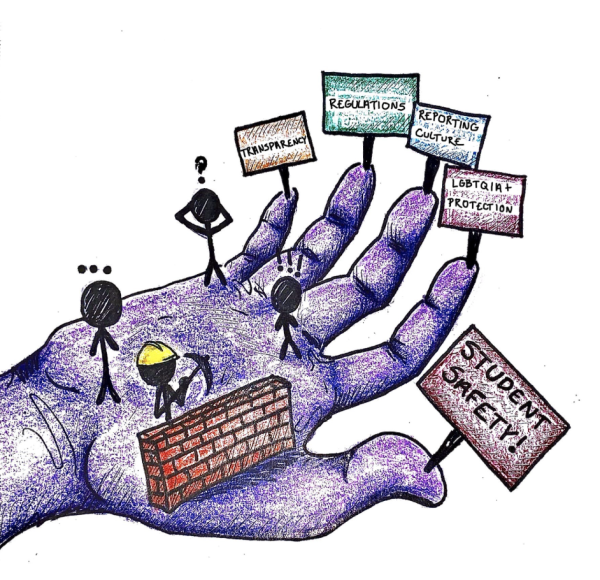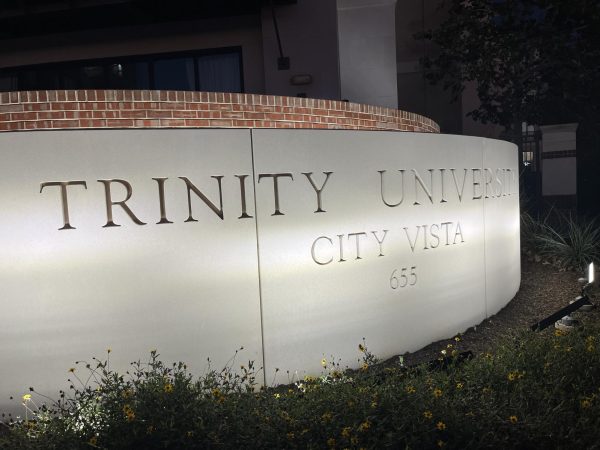New abortion bill takes effect in Texas
Community reacts to unprecedented abortion ban
On Sept. 1, Texas enacted Senate Bill 8, one of the nation’s strictest abortion bills. The next day, the U.S. Supreme Court voted 5–4 to leave the bill in place after an emergency appeal from abortion providers.
Also known as the Texas Heartbeat Act, the law prohibits abortions once medical professionals can detect fetal cardiac activity. This can be as early as six weeks and before many people realize they are pregnant. The law creates exceptions for medical emergencies, but not for pregnancies resulting from incest or rape.
What makes S.B. 8 unique is that the state itself is not responsible for enforcing the law. Instead, private citizens are encouraged to sue abortion providers and those who “aid and abet” the performance of an abortion after the detection of a fetal heartbeat. Anyone who successfully sues is entitled to at least $10,000.
S.B. 8 sparked reactions from all sides across the nation as well as on Trinity’s campus. Karina Treviño, junior and president of Tigers for Life, reflected on her approval of the bill.
“My initial reaction was thankfulness and surprise,” Treviño said. “I was thankful because I think it’s good that Texas is an example to the other states and even other countries. So I think it’s very good that Texas is recognizing that once it has a heartbeat, the fetus is valuable and should be protected.”
Treviño, who wants to balance supporting women in crisis and protecting the unborn, believes it is important that abortion patients themselves cannot be prosecuted under the new law.
“I don’t see any problem as long as women are not being punished,” Treviño said. “Clearly the person who’s doing the evil thing would be the abortionist or the abortion facility, so going against them, I’d be down because they’re not the ones going through a tough situation of a crisis pregnancy, and they’re committing something that I believe is terribly wrong.”
However, others are greatly concerned over the potential effects of the bill. Junior Meg McDonald, president of TU Pro Choice, questioned the constitutionality of the law and expressed worry over its impact on Texans.
“There are a lot of people whose livelihood is making sure that people have access to abortions,” McDonald said, “and then, just people in general who need access to abortions. [The law] can be really damaging to lower-income communities and people of color. The access that they have to abortion is going to be so severely limited.”
McDonald went on to comment about the Trinity community specifically.
“There are a lot of people on this campus who are having to make their own reproductive health decisions for the first time in their lives, and we don’t want to know that there are people on this campus who aren’t being able to get the reproductive health services that they need,” McDonald said.
David Crockett, professor and chair of the department of political science, identifies as pro-life and would like to see the country move away from the practice of abortion. However, he described mixed feelings about the methodology of the bill itself.
“I think that the Texas bill is a bit too cute by half by essentially … passing a law that they believe will outlaw most abortions without it actually being a state sanction,” Crockett said. “Interest groups with an agenda would therefore be activated in this way, and I don’t know that this is a measure that makes constitutional or legal sense, and I don’t think it really changes minds.”
There have already been developments as a result of the new bill. In San Antonio, three out of the city’s four abortion facilities have stopped offering the procedure out of fear of legal action.
According to Sarah Fontenot, professor of health law, this is due to the tight limitations of the law.
“[S. B. 8] is shutting [abortion clinics] down,” Fontenot said. “As has been pointed out, there’s not really six weeks. Most women do not know the minute they become pregnant. So there is a very, very, very small window.”
It is unclear whether the university will be directly impacted. Marcy Youngdahl, director of Integrated Counseling and Health Services, was unable to comment but submitted the following statement:
“Trinity Student Health Services will continue to provide contraception services, gynecologic preventive care, sexually transmitted infection screening and prevention education, as well as referrals to off campus resources when needed.”
THE FUTURE OF ABORTION IN TEXAS
The nation’s response to the Texas bill has continued to unfold since the beginning of the month. On Sept. 9, the Justice Department sued the state of Texas over S.B. 8, claiming that the law violated the Constitution.
According to Crockett, some kind of action is required for the lawsuit to move forward.
“It’s one thing for the state to pass a law; it’s another thing for action to take place on that law to give the DOJ something to grab on to, to sue about, and I think that’s what people are waiting for, to see well, ‘What will this law do?’” Crockett said. “It’s one thing to pass a law, but if nothing happens, it’s just there. But if you see people in the state starting to take action contrary to the law or sue people under the auspices of the law … this ends up going back into the legal system again.”
Crockett noted that this action could come in the form of Alan Braid, a doctor in San Antonio who openly admitted to performing an abortion after the allotted six weeks. Two citizens have already filed lawsuits against Braid, although neither plaintiff did so with anti-abortion intent specifically.
However, none of these developments stop the bill from affecting Texans in the meantime.
“In the long run … I’m not sure that this law will stand,” Fontenot said. “But that doesn’t mean that health services … will not be denied to countless women in the interim. And it depends on how the DOJ proceeds, but if this is like the physician who just did an abortion, announcing that he broke the law in order to challenge the law, it could be years before that goes to court.”
Despite the polarizing nature of abortion, Fontenot hopes that the Trinity community can move away from discussions of right and wrong and instead maintain an academic perspective.
“This is not about screaming at each other,” Fontenot said. “It’s about respectfully disagreeing. This is a tough issue for everyone. It raises fascinating, important questions on individual rights and what’s the proper role of government.”
Crockett echoed this sentiment, calling for a more intentional and principled discourse.
“That’d be an argument that would be worth actually having, to see what are the premises and assumptions people are making about the issue,” Crockett said. “What are undisputed facts about the issue? How do we apply those when it comes to ethical thinking? That’s a really hard thing to do, but it’d be nice to see.”











